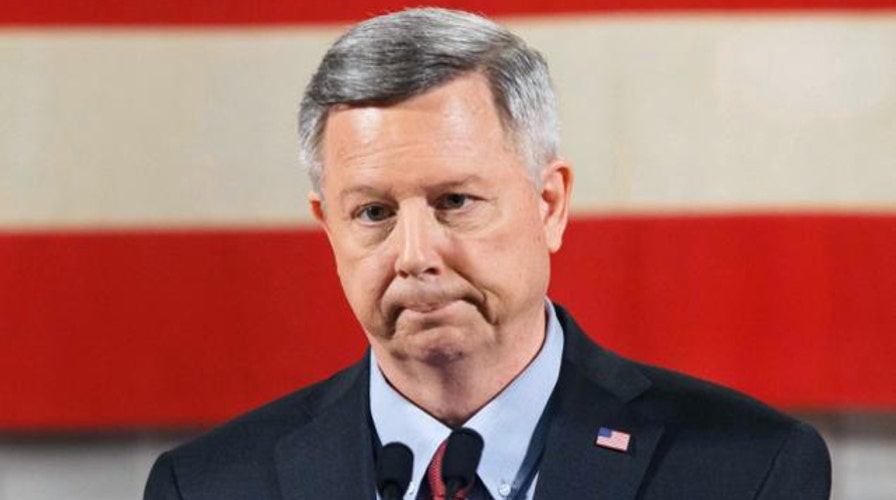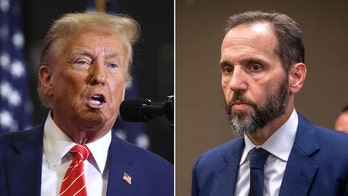Neb. drops plan to end personal, corporate income taxes
William La Jeunesse reports on Gov. Heineman's decision
It was a bold idea from Nebraska's popular governor leading a state with the country's second-lowest unemployment rate -- do away with the state's personal and corporate income taxes.
But just weeks after announcing his plan, Gov. Dave Heineman was compelled to pull the plug on the plan and hope that a modified version might be resurrected in 2014.
The short-lived push offers a window into how special interests can quickly derail a vision for tax reform.
Heineman's plan, which grabbed headlines throughout the state, would have eliminated all income taxes by closing a bevy of sales-tax exemptions.
The $5 billion in breaks are three times what actually comes into the treasury from the sales tax.
Heineman figured that by eliminating only half of the exemptions he could then eliminate the annual tax bills.
"Today, we compete in a national and a global economy,” he said. “And to that extent, capital is more mobile. Talent is more mobile and you have to be able to compete in that environment. And that demands a lower income tax rate.”
But as soon as Heineman announced his plan, interests in Nebraska began doing their own calculations and didn't like the numbers.
"From a farming and ranching perspective, it certainly would not have been simpler," Nebraska Farm Bureau President Steve Nelson said. "We would have paid sales tax on a lot more items. It would have required significantly more record-keeping for farm and ranch related businesses. It would have added to the cost of growing crops and growing food and so those are all negatives for business that would have raised the cost of the products."
For decades, Nebraska has offered scores of sales tax exemptions for various interests. Many churches are exempt from paying sales tax for their activities, as are florists. And out-of-state private airplane owners even get a break.
But more significantly, there are a slew of exemptions for the state's economic engines in manufacturing and agriculture.
Heineman was mostly agnostic on which business-related exemptions to eliminate. He even jokingly offered a reporter the opportunity to name which ones to end. The powerful Nebraska Farm Bureau, state Chamber of Commerce and many other groups weren't willing to take the chance that their favored protections would end and rallied support against the measure.
"For farmers and ranchers that would have meant having sales tax on seed, fertilizer, fuel, irrigation fuel and water, machinery, those kinds of things," Nelson said from his farm in Axtell. "So it would have been a huge increase in sales tax." Farmers argue the state’s property tax is the primary thorn in their bottom lines and want that included in any discussion of tax reform.
There was also pushback from lawmakers who feared the governor's plan would harm the state's poor. "It's not fiscally responsible to put all of your eggs in one basket and the governor's proposal is to do just that: to put all of our state's obligations on the back of our sales tax and eliminate our corporate and income tax," State Sen. Danielle Conrad told Fox News. "I just think that's too risky."
The governor voiced hope that the legislature would still move ahead.
"The legislature doesn't want to move quite as quickly as I do but we're going to move forward with tax reform," Heineman said recently. "I was probably a little more bold than they're prepared to do."
Returning to her car from a trip to a Lincoln grocery store, resident Julie Kokrda said all of the talk over taxes is a good idea. "I think there's probably a middle ground -- a balance. I like the idea of income tax going away and looking at other ways for that revenue."
The mother of three says Heineman's plan held a lot of appeal to retirees. "I know a lot of people who left the state of Nebraska because they've retired with pretty good pensions or incomes and have gone to states like South Dakota or Texas or Florida that don't have state income tax," Kokrda said. "A lot of them are lifelong Nebraska residents who'd love to stay here but look at other alternatives simply because of the tax structure that we have."
Heineman said he had a number of governors approach him with words of praise for his efforts and insists that with time and understanding a tax reform law will happen.
"What we're seeing happening in Nebraska is a commitment they need to understand it better, they want to think about it more, both the agriculture group, the business community, they're willing to move forward with tax reform," he said. "We're going to move forward with tax reform and ultimately we will have a package that will pass.





